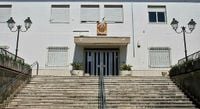The political landscape in Capaccio Paestum is facing severe upheaval as a judicial scandal unfolds, exposing deep-rooted connections between organized crime and local governance. As the municipality gears up for elections scheduled for May 25 and 26, 2025, the recent arrests of prominent political figures have raised urgent questions about electoral integrity and the influence of the mafia in the region.
According to the judiciary, there are confirmed ties to organized crime in Capaccio Paestum, which has drawn the attention of the Anti-Mafia Commission. Deputy Pino Bicchielli, president of the Investigative Committee on the Cilento System, and Senator Antonio Iannone, secretary of the commission, are now calling for immediate action. They are set to inquire with the relevant minister about the potential need to postpone the upcoming elections or extend the current administrative receivership, which is already in place.
The atmosphere is increasingly tense, especially following the recent arrest of Franco Alfieri, a former mayor, and the ongoing investigation by the Anti-Mafia Investigation Department of Salerno. The implications of these events have sparked calls for heightened vigilance over the electoral process. With the political stakes rising, some are even advocating for a postponement of the elections until 2026.
Among the six candidates preparing for the electoral battle is Antonio Bernardi, a former municipal police officer who recently found himself imprisoned for attempted extortion against Alfieri and local entrepreneur Picariello. Bernardi, who previously ran for mayor with the 5 Star Movement in 2017, was seen as a fresh face in the civic list “Capaccio cambia ora.” However, his arrest has sent shockwaves through the local political community, raising questions about the integrity of the upcoming elections.
Bicchielli has voiced serious concerns, stating, "What emerges from the investigation lays bare the presence of a power system deeply rooted in the area." He pointed to Alfieri's overwhelming victory in 2019 as evidence of an electoral pact based on favors exchanged for votes. "A concrete signal is needed to restore legality," he emphasized.
Senator Iannone has also expressed the necessity for vigilance, stating that the upcoming elections must be safeguarded against potential manipulation by political patronage systems. He presented a parliamentary inquiry to Minister Matteo Piantedosi, urging a thorough examination of any connections between Alfieri and organized crime that could affect administrative functions in other entities where he has served.
Adding to the turmoil, Gigi Casciello, the Campania coordinator for Noi Moderati, has called for a significant shift in the political landscape. He remarked, "The new arrest of Alfieri and his ties to entrepreneur Squecco strengthen the need to push back against a political world overshadowed by long-lasting corruption."
Despite these challenges, the Prefect of Salerno has confirmed that election rallies will proceed as planned for the municipalities voting at the end of May, including Capaccio Paestum. However, the political climate remains fraught with tension, particularly following the resignation of Giuseppe Capozzolo, an external manager of the municipality's Accounting Office. His resignation came after Iannone questioned his suitability in a parliamentary inquiry.
Capozzolo stated, "I accepted this challenge in a municipality in pre-default, but in light of such slanderous allegations, I have decided to resign." Iannone responded, asserting his right to protect the law and the territory, indicating he would consider counter-suing Capozzolo for defamation.
The recent arrests and ongoing investigations have raised alarms about the potential ramifications for the upcoming elections. The political scandal is not just a local issue; it poses a broader question about the integrity of democratic processes in regions where organized crime holds sway. As the situation develops, the demand for transparency and accountability becomes increasingly urgent.
Judge Annamaria Ferraiolo, who is overseeing the case, underscored the severity of the situation, particularly regarding Bernardi's role as an intermediary between Alfieri and the entrepreneur Roberto Squecco. The judge highlighted Bernardi's alarming willingness to execute illicit directives, which further complicates the electoral landscape.
In addition to Bernardi, Maria Rosaria Picariello, the former councilor for Social Policies and Education, has been placed under house arrest for personal favoritism. Allegations against her include making false statements designed to assist Squecco, Bernardi, and another municipal employee in evading investigations. The judge noted her troubling tendency to provide misleading information that obstructs investigative efforts.
Picariello, who was the most voted candidate in the last municipal elections, was initially seen as a potential mayoral candidate. However, the recent developments have severely impacted her political future, as she had shifted her support to a group led by lawyer Gaetano Paolino, which absorbed much of the outgoing majority.
As the election date approaches, the political landscape in Capaccio Paestum is in flux. With calls for postponement gaining traction and the specter of organized crime looming large, the upcoming elections are poised to be one of the most contentious in recent memory. The interplay of justice, politics, and public sentiment will determine the future of governance in this troubled municipality.
As the dust settles from these unfolding events, it is clear that the integrity of Capaccio Paestum's political framework is under intense scrutiny. The coming weeks will be crucial in determining whether the elections will proceed as planned or if further measures will be taken to ensure a fair democratic process.






